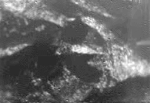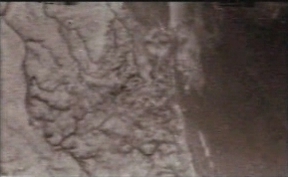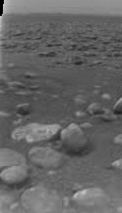No. 23 - First Science Results
On 14 January 2005 the Huygens mission finally became a reality. The probe made its susccesful descent through the atmosphere of Titan and to a landing on the surface of this distant moon.Scientists have revealed their initial findings based on analysis of the Huygens data. For latest results visit saturn.esa.int.
The mission has already been deemed an outstanding success. Despite a problem with one of the communication channels the spacecraft is understood to have performed beyond its design requirements. The spacecraft is thought to have spent around 2 hours 15 minutes descending through to the surface and maybe surviving for up to an hour - far beyond the three minutes intially envisaged.
Animations and Models
Follow these links to:
Huygens Model and
Huygens Probe Descent
First Results
The DISR instrument has returned around 350 images from the descent phase. The first of those images are shown below. Note all images are unprocessed.
|
Taken at an altitude of 8 kilometres with a resolution of 20 metres per pixel the image shows what could be the landing site, with shorelines and boundaries between raised ground and flooded plains.
Credit: ESA/NASA/JPL/University of Arizona |
 |
|
Taken from an altitude of 16.2 km this image has a resolution of around 40 m per pixel. It shows possible drainage channels and a shoreline Note - this image is unprocessed.
Credit: ESA/NASA/JPL/University of Arizona |

|
|
An unprocessed image of Titan's surface at the Huygens probe landing site showing what are believed to be small sized blocks of ice.
Credit: ESA/NASA/JPL/University of Arizona |

|
Last Update: 1 September 2019



